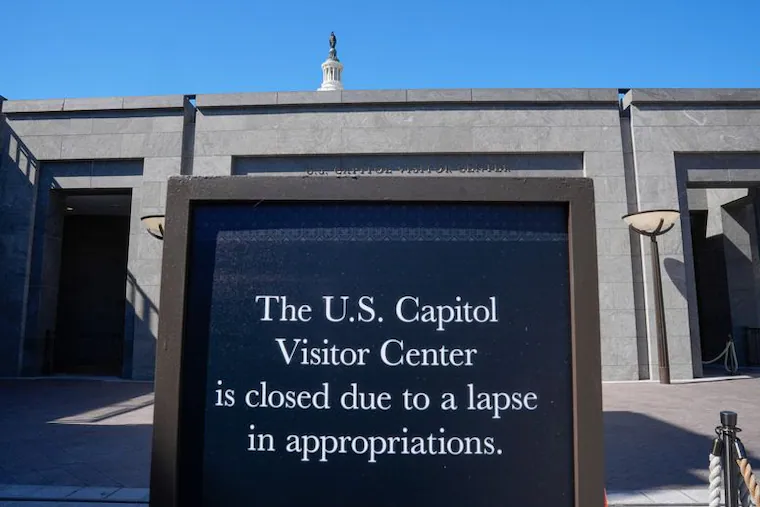
At 12:01 a.m. on Wednesday, Oct. 1, Republicans in Washington shut down the federal government for the first time since 2019. Then, as is true now, Donald Trump was president, and Republicans controlled Congress.
Shutdowns are triggered when Congress fails to fund the federal government and can be devastating for the country. They threaten to disrupt services such as the Special Supplemental Nutrition Program for Women, Infants, and Children — known as WIC — and loans for small businesses. They risk interrupting air travel and halting the work of our federal courts.
The Republican-led House passed a temporary measure to fund the government through Nov. 20. The Senate failed to pass that same measure because it fell short of the 60 votes required. Senate Democrats rightly rejected the Republicans’ measure because Republicans do not want to pay for healthcare for millions of Americans. (Notably, our Democratic senator, John Fetterman, voted with the Republicans.)
Republicans previously cut portions of the Affordable Care Act this summer. In negotiations to avert the shutdown, Democrats sought to make permanent subsidies for healthcare coverage under the ACA — subsidies currently set to expire at the end of the year. That extension would provide healthcare to 3.8 million more people.
But Republicans refused, opting not to extend those subsidies, and thereby risking four million people losing healthcare over the next decade. As a result, Americans covered by the ACA will see their out-of-pocket premiums increase by more than 75% on average, which would benefit insurance companies at the expense of everyday people.
In addition to Americans’ access to healthcare hanging in the balance, shutdowns also harm federal workers. During shutdowns over the last 15 years, the executive branch was usually prepared to suspend without pay between 35% and 40% of federal workers. As of now, the Trump administration is preparing to suspend 23% of federal workers. Although the planned suspensions fall below recent trends, the administration is preparing to lay off swaths of the federal workforce, highlighting its goal of decimating it.
Under that plan, many federal workers will be fired permanently instead of suspended temporarily, and the back pay that suspended employees usually get upon returning to work will not be available to those fired. The Trump administration also raised the stakes for suspended workers by asserting that they are not entitled to back pay this time around.
Pennsylvania is home to more than 100,000 federal workers, the bulk of whom work for the U.S. Department of Veterans Affairs and the military. About 34,000 of those federal workers reside in Philadelphia. This Republican shutdown is a direct threat to the economic stability of those employees, the Philadelphia region, and the country.
In response to the Trump administration’s brazen threat to fire federal workers, the American Federation of Government Employees and the American Federation of State, County and Municipal Employees — two unions that represent federal workers — sued the administration to stop the plan from taking effect. As AFSCME president Lee Saunders noted, “If these mass firings take place, the people who keep our skies safe for travel, our food supply secure, and our communities protected will lose their jobs.”
The Trump administration is playing politics with the lives of our neighbors who are federal workers, their families, and the well-being of our country. We will all be worse off for it.
Although every shutdown is different, it is generally accepted that each week of a shutdown subtracts one-tenth of a percentage point from the country’s total economic output that quarter. Thus, the longer a shutdown persists, the worse the economic consequences will be for our country and the world.
The potential effects of this Republican shutdown are amplified by the economic instability Americans already feel because of the taxes Trump has implemented as tariffs. He recently announced, for instance, tariffs on imported timber, lumber, kitchen cabinets, bathroom vanities, and upholstered furniture. These taxes — in addition to ones he previously announced on items like car parts — risk jacking up the cost of living for many.
In Philadelphia, rising costs combined with a worsening job market, inflation concerns, and stalled income growth push families to the brink of a financial cliff, forcing them to stress about providing for themselves. It is an unacceptable reality that is yet another marker of Republicans’ callous disregard for working families, and it is against this backdrop that Republicans shut down the federal government.
But this Republican shutdown was entirely avoidable. Instead of addressing the cost of living and healthcare crises facing millions of Americans, Republicans opted to plunge our country and economy deeper into chaos. This mess is one of Republicans’ making, and they must pay for it in the elections to come.